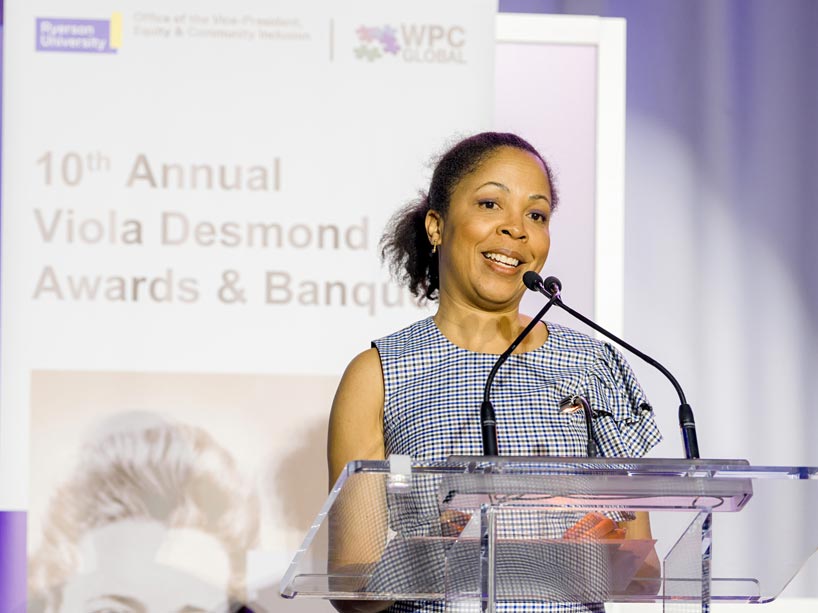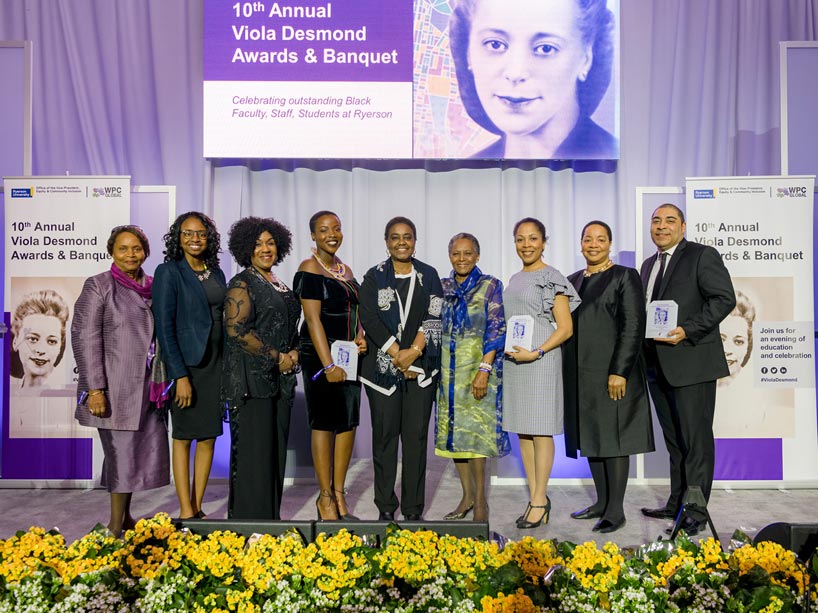For the love of science

Photo: Emily Agard, director of SciXChange at Ryerson University, received the Mdme. Vivian Barbot Ryerson Staff Award at the 10th Annual Viola Desmond Awards & Banquet Dinner on May 11. Photo by Clifton Li.
Science is fun. Science education offers valuable skills. So, why can science education seem so intimidating? As director of SciXChange at Ryerson University, Emily Agard is devoted to making science, technology, engineering and math (STEM) accessible for students -- through everything from summer day camps to nighttime coding classes.
“I’ve always had a love for science since childhood,” said Agard. “If you look around, you’ll notice that kids do. If you go to the Science Centre on any given day, you’ll see kids excited about it. Sometimes interest in science drops off in high school for various reasons. Some students might not see it connecting with their everyday lives.”
Another factor is that STEM is still a male-dominated sector—a fact that Agard knows intimately. “I tell [girls] about some of my struggles and how I overcame them,” she said. “I don’t want to set them up for failure by thinking, ‘Oh, it’s so easy,’ and then if they pursue that field and have trouble, they might think, ‘Oh, I’m not good enough.’ I tell them about the trials and tribulations, but how every challenge was worth it. Resilience is a big message.”
On May 11, Agard was one of the honourees at the 10th Annual Viola Desmond Awards Ceremony, a celebration of Black Canadian women in the Ryerson community. Agard received the Mdme. Vivian Barbot Ryerson Staff Award. Hosted by Ryerson’s Office of the Vice-President, Equity and Community Inclusion, the event is named for the Black Nova Scotia businesswoman who fought against racial discrimination, becoming a Canadian civil rights icon. The ceremony included a special appearance by Wanda Robson—the younger sister of Viola Desmond. The new $10 bill featuring Desmond was also presented by representatives from the Bank of Canada.
If science doesn’t seem like an obvious career path for many women and girls, it initially didn’t for Agard, either. “Even throughout school when I thought I was going to go into law, I took science classes for the fun of it,” she remembered. “Looking back, that should have been a clue, but all through undergrad I thought I was going to be a lawyer. But I took life sciences and took immunology, and that really piqued my interest even further. I went on to do my PhD in that.”
“We’ve always tried to make our outreach inclusive,” said Agard. “‘Inclusive’ isn’t just about diversity. If you want to bring in a diverse array of children, you have to support them once they’re here. Maybe you can provide lunch to kids from low-income families—it’s not good if you bring them in and they’re struggling for lunch.”
One of the biggest challenges in science recruitment is addressing science’s gender imbalance. Agard knows that the challenge is not so much getting women and girls interested in science—it’s keeping them from becoming discouraged.
“My parents were both highly educated, and there was always no question I would be going into higher education,” she said. “I didn’t have some of the struggles that some people from maybe lower income backgrounds have to deal with. But there has definitely always been a part of me that has felt I have something to prove. Go to a conference, or even look around here—there aren’t many women of colour in science. I’m alone a lot in that.
“I also tell [prospective students] about the various fields a science education can lead to. Whether you end up in a career directly related to science, you develop transferable skills. Science even helps you understand a lot of the issues that you might be voting on.”
But the greatest attraction of science education is science itself. The greatest reward of recruitment is connecting students with their passion. “Even just seeing the looks on the people’s faces when we engage them. That’s even more rewarding than the official metrics we collect afterwards.”

Photo: The 10th Annual Viola Desmond Awards & Banquet Dinner were held May 11. From left: Pamela Appelt, Deborah Mepaiyeda, Mayann Francis, Susanna Nyaga, Malinda Smith, Vivian Barbot, Emily Agard, Denise O'Neil Green and Darrell Bowden. Photo by Clifton Li.
Four awards were presented at the Viola Desmond Awards on May 11. In addition to Agard, Melanie Knight (associate professor and undergraduate program director, Department of Sociology) received the Dr. Malinda Smith Ryerson Faculty Award; Susanne Nyaga (School of Social Work, 2017 RSU president) received the Honourable Mayann Francis Ryerson Student Award; and Grade 12 student Shanique Peart (Central Technical School) received the Ms. Viola Desmond High School Student Award.
To contribute to the student award and bursary in Viola Desmond's name, please visit supportryerson.ca/violadesmond.